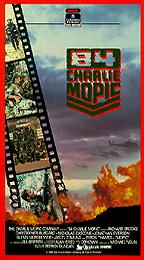
84 CHARLIE MOPIC
US, 1989, 90 minutes, Colour.
Jonathan Emerson, Nicholas Cascone.
Directed by Patrick Duncan.
84 Charlie Mopic is a vivid portrayal of the Vietnam war. Set in 1969, it focuses on a small unit of six men and the photographer who follows them on a Mission. It was written and directed by Vietnam veteran, Patrick Duncan, who wanted to make an intimate portrayal of war, to show what really happens to young men in battle.
He uses the device of the motion picture soldier accompanying a mission - the code name for the photographer is 84 Charlie. Mopic stands for motion pictures.
The film has a strong cast of unknown actors. They invest their characters with vivid and realistic life. The film uses the device of showing the film being made, interviewing the personnel and detecting their attitudes and characters, as well as following them into battle. The intention is to make an information film for trainees. However, part of the action is useful material, but most of the action is the actual portrayal, even death, of the men in the group. The artificial device works particularly well - the audience knowing that they are watching an artificial device, yet nevertheless becoming fully involved. The final sad irony is the death of 84 Charlie Mopic..
The film compares particularly well with the bigger budgeted epics and explorations of the Vietnam war. It might be compared with such a film as Platoon. However, the design of the film is not to give an artistic interpretation and meaning to the events, but rather portray them and let characters and events speak for themselves. They do.
1. the impact of the film? The presentation of war? The '70s and '80s tradition of Vietnam war films: action, focus on the men? The importance of meanings of war, fighting, survival? The meaning of the Vietnam war for the United States? Consequences?
2. The vision of Patrick Duncan in his writing, directing? Veteran experience? His perspective? The dedication?
3. 84 Charlie Mopic and his commission, his story of editing film stock, showing the ends of stock and running out of film during the action, on location, the importance of the initial interviews, accompanying the group on its mission? The aim of the film? To record, to help trainees? Information? The overlapping of fact and fiction? The effect on. the audience of this device and watching the film and becoming involved? Involved and detached? Emotional responses? Reflecting on the meaning of the war for these men? Wider-reflections? The final irony of the cameraman being shot?
4. A small saga of the Vietnam war? A fable about men in war? A parable about war and survival? The messages of the film - about human nature, about war, the enemy, bonds, courage, fear?
5. The atmosphere of Vietnam and the jungle, the campsite, the Vietnam village? Authentic atmosphere?
6. The focus on the men: ordinary, understanding their background, the fact that they were there, the mixed motives, their interaction in the group, Americans in Vietnam, their knowledge about Vietnam itself, the Vietnamese, the strategies of their officers? Their ignorance, just doing their job? War as fighting, surviving, dying?
7. O.D. as leader, serious, well-trained, angry at the interviews and stopping Mopic? His relationship with each of the men, ready to go on the mission, his plan - giving information? The ammunition, the strategy, knowledge of the jungle, the traps, etc? The nature of the mission? The achievement, the return, the men being wounded, his handling of the situation, the dead men? The decision to take the bodies back or not? The wounded Viet Cong and the strategy for attacking this unit? Wanting L.T. to kill the Viet Cong, personalising the enemy for him, giving him the knife? His own wounds, leading the men to the helicopter? Success but at what cost? The fact that he was a black leader?
8. The contrast with Easy: the clown, clowning around, personality, quips and jokes, on the mission, relationship with Hammer? In action, relating to the groups, his reaction to danger? The drugs? His concern, help, surviving?
9. Hammer and his background, tough, gung-ho, the opportunity for legitimate violence? His personal angers, in-.the squad, the roles that he was asked to perform, his death? His final talking into the camera about his father and doing his job well?
10. Cracker and the South Carolina-background, the story of his family, white trash and their poverty, his phone call to his wife with nothing to say? The importance of doing his job, his philosophy of doing the right thing? Opportunity to get out of his poverty? Asked about the black leader and his references to questions about the real world? A philosophy of life, comradeship? Relationship with the men, courage? Death?
11. The contrast with L.T. and his focus on career, joining the army, opportunities, to be tough, National Guard background? Ideals, facts? In the squad, his explanation of his ambitions?. In action? The demand by O.D. that he kill the Viet Cong, the strong personalising of the dying man, identity, name, age? His killing the Viet Cong? His being wounded, surviving?
12. Pretty Boy, the Malibu background, friendships, involvement, death?
13. The presentation of the squad, their training, tactics, how to cover their tracks, false leads and clues, booby traps, ammunition, hiding from the Viet Cong, attacking their squads, killing, the helicopters?
14. The personalising of 84 Charlie Mopic, his questions from behind the camera, seeing him in front of the camera, the finale and his death?
15. A vision of the war in 1969? The perspective of the '70s and the end of the war, of the '80s and the Vietnam veterans? A glimpse of the past? Questions about the consequences?